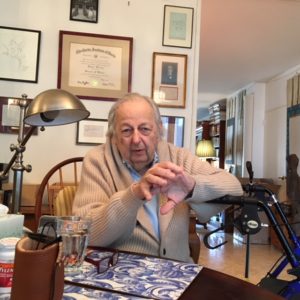
Anne-Sophie Mutter has long maintained supreme artistic poise in the classical violin world, but the wild card in her repertoire has often come from her ex-husband, the multi-Oscar-winning composer André Previn. Now 88 or 89 (depending on whom you believe), he has written ten works for her, and though his new piece The Fifth Season (given its world premiere on Sunday at Carnegie Hall) wasn’t his best, he continues being a good counterbalance in her repertoire.
In fact, The Fifth Season, which was a Carnegie Hall commission, suggested perhaps he doesn’t take himself seriously enough – in contrast to his excellent song cycle Ten By Yeats, premiered earlier this season by Renée Fleming. That piece showed him in the thrall of W.B. Yeats in ways that galvanized his compositional impulse with a focus and solid through-line that the new Mutter-premiered piece needed.
As it was, he gave Mutter long solo passages with the same minor-key cast as what followed on the program, Bach’s Partita for Unaccompanied Violin No. 2 (the one in D minor with its famous Chaconne movement). Anything but a riff on Vivaldi’s Four Seasons, the new piece felt very much like a soliloquy, with grand statements from the violin and minimal writing for piano, the depths of which couldn’t have been expected from a younger composer. At times, the piece entered territory occupied by Bartok’s Sonata for Solo Violin (an intense place to be).
Less satisfying was the way the piece slipped away from something that he needed to write and into something that he perhaps thought he was expected to write – more animated, less dense, less personal. And pianist Lambert Orkis needed to be given interesting things to do. In fact, Previn delivered a slam-bang ending, but one that danced around its formulaic cadence with split-second wit.
The colloquial lack of rigor in Previn’s music gives an alternative aesthetic to Mutter’s serious, high-integrity recitals. No doubt there will be more music coming from him, even though their four-year marriage ended in 2006. “You know how people say that their marriage didn’t work? With us, the divorce didn’t work. We call each other every day regardless of where we are. Maybe she’s in China and I’m in Cincinnati, but we find each other,” said Previn recently. She, Renée Fleming and Tom Stoppard keep him composing now that – thanks to the precedent of Elliott Carter – he is fashionably old.
A few weeks ago, a series of movie restorations at the Museum of Modern Art (curated by Martin Scorsese) included the high-budget but little-known 1946-studio film I’ve Always Loved You, about the lives of concert pianists. Early on, there’s an audition scene, and faster than you could say, “that’s … that’s ….”, the teenaged Previn came and went, playing briefly at the keyboard, in the year that he graduated from high school.

Much of the rest of the recital was evidence of Mutter’s enterprising appetite for repertoire – and her ability to sell it to an audience with her intellectual artistry, glamorous tone and statuesque presence. With phrasing, accents and tempos that etched-in-granite sense, the Bach was among the best performances I’ve heard in recent years on a modern instrument. She transcended any school of playing.
Well, mostly. Every so often, she indulged in a tendency similar to that of her mentor Herbert Von Karajan. In Karajan’s recording of the Bach’s Brandenburg Concertos, for example, a repeating sequence at a slow-ish tempo became dramatized as some sort of processional whose degree of specificity constricted the music’s meaning over the long run. Call it a “cinematic characterization” that doesn’t stand the test of time. Mutter did that here and there. No harm done, but should she be planning to record these violinistic touchstones in the near future – and it’s about time – that tendency might be best curbed. And the Chaconne? Monumental, of course.
The tempo flexibility often heard in Mutter’s playing of late renders highly individualistic and emotionally committed performances. But in the Brahms Violin Sonata No. 2, this tendency made the music turn episodic. Without the long sweep, the music stays at an emotional distance. The second movement, though, started with a demure tone color almost suggesting a prayer, but built into the kind of continually expanding magnitude and depth of tone that Karajan achieved with his Berlin Philharmonic.
Ending with the Penderecki Violin Sonata No. 2, Mutter was out on a limb. Respected but not always loved, Penderecki had some people leaving early. But not many. The 35-minute sonata is formidable, full of arresting ideas (like the haiku-like use of pizzicato in the opening movement), tone clusters that had Orkis playing occasionally with his elbow (he can handle it), and moving in and out of scorched-earth landscape that’s bleak even by Shostakovich’s standards. Grotesque dances and bold, emblematic motifs seize the foreground and then retreat.
The Penderecki doesn’t project the depth of conviction heard in Shostakovich’s searing late-period sonatas. But it’s a major piece of chamber music, and one that suits Mutter’s sense of musical dramatization; it had her giving some of the best playing of the recital. Even better, the piece was not recent, but written in 2000. And unlike the love-them-and-leave-them approach that some star soloists take toward works written for them, Mutter has returned to this piece, and gave it the prime slot in this high-profile recital. Take note, Yo-Yo Ma.


Once caught a glimpse of Maestro Previn taking the applause at Carnegie Hall a few years back, for an earlier work that he composed for Ms. Mutter. He seemed quite frail, so I guess that he’s devoting his energies to composing, which can certainly be mentally taxing, but seems much less physically demanding than conducting, not to mention the travel required for guest-conducting. Here’s hoping for many more new works from him, in kind of an Elliott Carter-like late flowering (though most likely w/o the dissonance).
BTW, I’m not sure the Zelig reference is the most appropriate analogy to use now, given all the overtones related to Zelig’s creator, and the connections to Previn.
Just remembered that Maestro Previn also has on his composing docket a new work for the Los Angeles Philharmonic’s centennial season next year. I also understand that there is supposed to be a video somewhere at some point where he gets to tell his side of the story about his short tenure as the LA Phil’s music director.
Thanks for writing I didn’t make the connection with the Zelig reference. It is now GONE.
dps